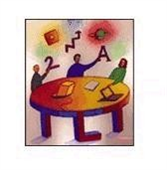
http://www.dillard.edu/index.php?option=com_content&view=article&id=821:nikki-giovanni-named-2010-commencement-speaker&catid=42&Itemid=846
Award-Winning Poet and Writer Nikki Giovanni Will Deliver Dillard University’s 2010 Commencement Address: University President Dr. Marvalene Hughes Said University Is Honored To Host A “National Treasure’”
Poet, essayist, novelist and educator Nikki Giovanni will address the 2010 graduates of Dillard University as commencement speaker on May 8, 2010. Graduation is at 8:00 a.m. on the university’s famed “Avenue of the Oaks.” Dillard University President Dr. Marvalene Hughes points to Ms. Giovanni’s body of work as evidence of her timeless brilliance and said Dillard is pleased to play host to a national treasure.
“I am in absolute awe of her prolific writing over an extended period of time,” Hughes said. “She preserves unique ‘evolving’ cultures, with a special emphasis on the exceptional cultural evolution of young Blacks and how they influence the world. She is one of the most thoughtful, dynamic speakers in today’s circles. We are honored to have her as our 2010 Commencement Speaker.”
For over 40 years, Ms. Giovanni has chronicled in her poems and essays the real “Black Feelings, Black Talk.” Her first published book of poetry in 1968 established her reputation as a “revolutionary poet” and the voice of her generation. In the four decades since her literary debut, Giovanni has written or edited over three-dozen volumes of poetry and essays. “Gemini” earned her a National Book Award nomination, “Love Poems” and “Blues” garnered NAACP Image Awards, “The Nikki Giovanni Poetry Collection” received a Grammy nomination for best spoken-word album.
Giovanni has won the American Book Award and has received over two-dozen honorary degrees to date. She has been recognized as woman-of-the-year by numerous magazines, and has been honored by nearly three-dozen cities from Los Angeles to Buffalo. The poet has also been honored by institutions as varied as the U.S. Information Agency, the National Council of Negro Women, and the Walt Whitman Birthplace Association, as well as the states of California, Tennessee, Virginia and West Virginia. Texas Tech even named a species of bat in her honor, the Micronycteris giovanniae.
Dillard students have reason to celebrate Nikki Giovanni’s appearance as commencement speaker. After Hurricane Katrina, Giovanni shipped her personal collection of books to Dillard for use in the Will W. Alexander library. A section of the library was dedicated in 2009 in Giovanni’s honor.
























